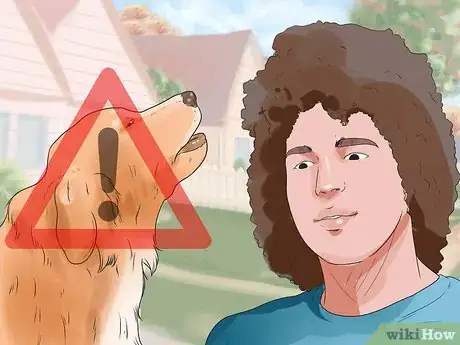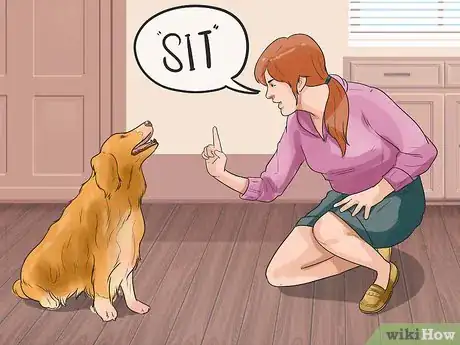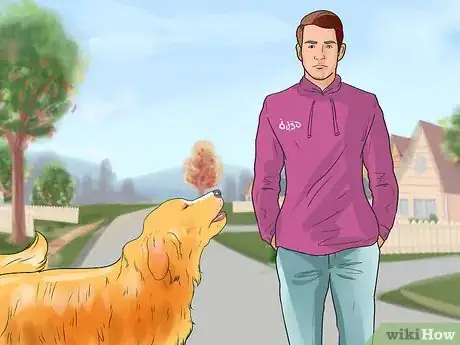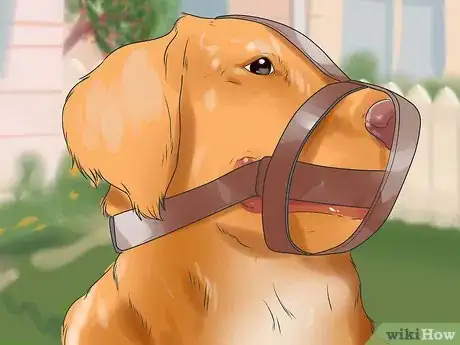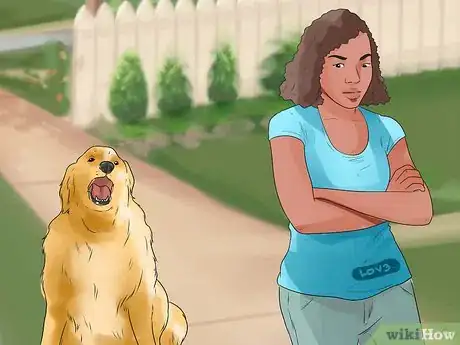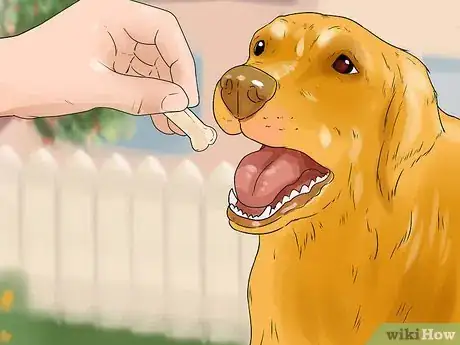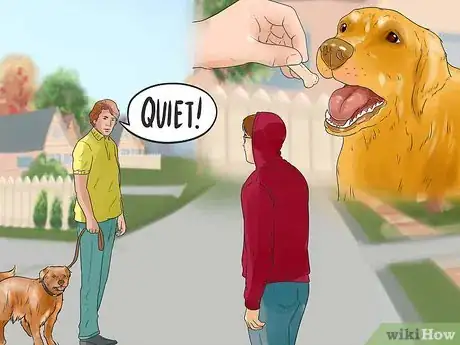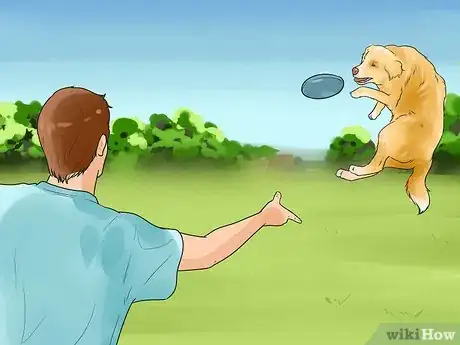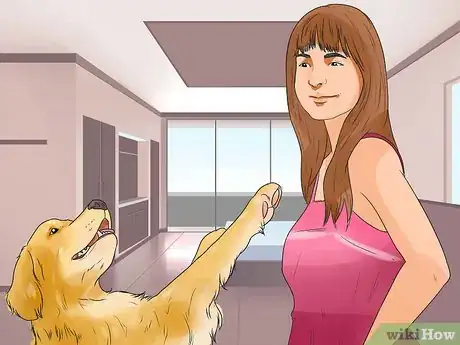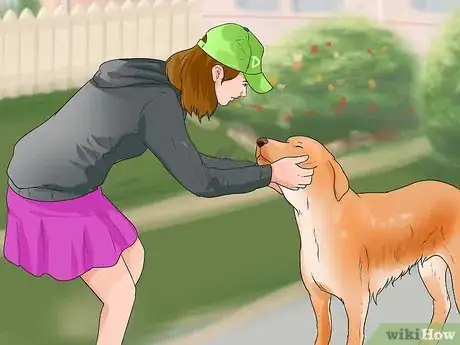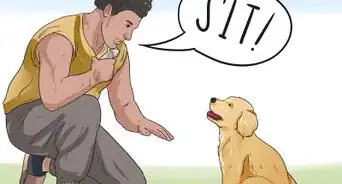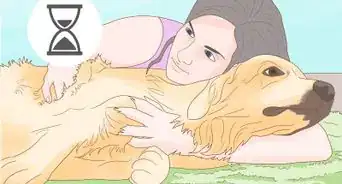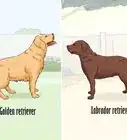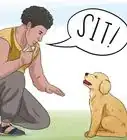This article was co-authored by David Levin. David Levin is the Owner of Citizen Hound, a professional dog walking business based in the San Francisco Bay Area. With over 9 years of professional dog walking and training experience, David's business has been voted the "Best Dog Walker SF" by Beast of the Bay for 2019, 2018, and 2017. Citizen Hound has also been ranked #1 Dog Walker by the SF Examiner and A-List in 2017, 2016, 2015. Citizen Hound prides themselves on their customer service, care, skill, and reputation.
There are 9 references cited in this article, which can be found at the bottom of the page.
This article has been viewed 70,406 times.
Golden Retrievers are generally quiet, loyal to their owners, and friendly to their friends. They were developed as bird dogs to retrieve shot animals, such as ducks and birds. Due to their cuteness and faithfulness, golden retrievers are one of the most popular types of dogs around the world. However, like human beings are different from one another, there are some golden retrievers that have distinctive characteristics from others, and some goldens bark a lot and are quite aggressive. Barking is your dog’s way of communicating verbally, so you won’t be able to stop it completely. The important thing is to make sure you don’t let him bark too much, and are prepared to stop it when he does.
Steps
Stopping Your Dog While Barking
-
1Figure out why your dog is barking. Golden retrievers, like any other dog, communicate verbally. Of course, they can’t talk, so instead, they bark. There are many types of barking, which are attempts to communicate different ideas and feelings. Understanding what your dog is trying to tell you is the first step to stopping it.
- Listen to the pitch, frequency, and duration of his barking. Rapid, high-pitched barks are usually signs of a happy or excited dog. Slower barking, or growling, usually means your dog is feeling aggressive or threatened. These kinds of barks will probably require you to move or change certain things in order to take away the thing he thinks is threatening him.[1]
- In many cases, your dog’s barking is a way to get your attention because he is bored or anxious. He is expecting you to respond in some way. In order to stop him, the best thing will be to remain calm.
- If you hear a sequence of short, high-pitched yelps (not barks), that is a sign that your dog is in trouble and needs immediate assistance.
-
2Give a command. Chances are your dog is barking at something, you need to distract him with something else. Giving him a command, something to do, will get him to stop momentarily.
- Don’t shout the command, as that will only encourage your dog's behavior. Instead, give your command in a firm, but understated tone.[2] This helps let your dog know that he can calm down, and there is no reason to be anxious.
- If you haven’t yet taught him to respond to a “Quiet” command, something else like “Sit” or “Stay” will work. You are trying to get him to turn his focus onto something else.
Advertisement -
3Stand in front of your dog. In many instances, your golden will be barking at something, trying to alert you to its presence. This could be an animal, another person, or something else that has caught his eye. To get him to stop, you need to change his focus.
- Look at the direction your dog is barking, and stand between him and what he is barking at. This lets him know that you are not worried about the other thing, and that he shouldn’t be either.
- This is a good time to give a command, something for your dog to follow. He will be looking at you, and should respond quickly. Make sure you remain calm so that he knows not to get excited.
-
4Grab his muzzle. If your dog is still barking and not calming down, grabbing his muzzle can quiet him down quickly.[3] This is how wolves quiet noisy members of their pack, which is especially important for them when hunting.[4]
- Reach the fingers of one hand under your dog’s collar to hold his neck in place, then place your other hand over the top of his muzzle. This mimics the way a wolf will close his mouth over a noisy member of the pack.
- When wolves grab the muzzle of others, they usually accompany it with a low growl to get the point across further. Add a command like “Enough” or “Quiet,” and make sure to say it in a calm, low voice, to give your dog a similar command.
-
5Ignore your dog. If your dog is barking at you, he is trying to get attention. Don’t give it to him by responding with a command or other forms of attention. Instead, you should wait for him to stop barking before responding in any way.[5]
- Once your dog stops barking, then you can reward him with attention or a treat. He should get the idea that silence is the way to what he wants. Once he begins to understand that, stretch out the time he must be silent before rewarding him.
- If you need to put your retriever in the crate, he will probably bark to show his displeasure. If he does that, turn your back on him and ignore the barking. Make sure he can see that you aren’t responding to his barking.
-
6Reward your dog. Dogs learn more quickly when they are praised than when they are reprimanded.[6] By giving the dog some treats, you are telling him or her, “You are rewarded because you quit barking!” Wait until your dog has gotten quiet to give him a treat.[7]
- If you are in the early stages of training, treats are good to start with. Later on, you can switch out the treats for regular dog food, which will usually get a good response. If you don’t have treats available, positive treatment like petting and saying “Good dog” will help get the point across.
- Do not give any treats or positive reinforcement until after your golden has stopped barking. If you respond too quickly, he will either get confused, or think that barking is what got the treat.
Preventing Your Dog From Barking
-
1Teach the quiet command. This is a good command to know, because it can give you a quicker response when you want your retriever to stop barking. [8]
- Create a situation that causes your golden to bark. It could be ringing the doorbell, or having someone walk by a window while he is inside.
- Hold a treat next to his nose, and calmly give the command. You can say something like “Quiet” or “Enough.” Just keep it simple and consistent, so that he can learn what the command is and what it means.
- When he gets quiet, give your dog the treat. Keep doing this, each time waiting longer and longer after he stops barking to give him the treat.
- Like any trick, the training will require you to have some patience while your dog learns how to respond. He may try to test your limits, so be firm and consistent.
- If your dog doesn’t seem to be getting it, and takes a long time to get quiet, you can withhold treats even if he does calm down. Wait a short amount of time after giving the command, about 10 seconds, and don’t reward him if he takes too long to quiet down. Make sure you do give the command once he has stopped barking, so he’ll know to associate the words with not barking.[9]
-
2Play with your golden retriever. Goldens are active dogs, and love to play with people and other dogs. If they don’t have enough to do, they will get bored, and bark to express their boredom.[10]
- Make sure your golden gets enough exercise. Letting him out to pee every morning is not enough. Run around, throw things for him to fetch, or just take him for walks to keep your dog active and healthy.
- Your dog may growl during play, especially while tugging on objects you are holding. As long as he avoids troublesome behavior like biting, and doesn’t show signs of discomfort, this is acceptable behavior. Just don’t growl at your dog. He will likely interpret this as aggressive behavior. This can lead him to either become more aggressive in response, or become afraid of you.[11]
- If your golden starts barking while playing, make sure you identify what is causing his barking and respond appropriately. Stop the play session until you have resolved the issue and the barking stops.
-
3Stay calm around your dog. This can be hard, because normally we are happy to see our furry friends. This is especially true with golden retrievers, as they are friendly and loving pets. Let your dog know there are appropriate times for excitement.[12]
- This is especially important when leaving or returning home. Your dog will probably be excited to see you, and run to you with an excited greeting. You need to remain calm, and not shower him with praise and petting. This tells him you coming home is a big deal, and he will get excited anyone arrives. He will also get more anxious when you leave and bored when you are not around. A bored golden is one that will bark more often.
-
4Be patient. Like all dogs, golden retrievers are creatures of habit who love routine. He does want to do the right thing. Be calm and consistent in your commands and training, and be prepared to withhold treats and praise when your dog doesn’t deserve them.
- If you are inconsistent in your responses, whether through the way you react, or even the tone you take while doing it, your retriever will get confused. He won’t be able to follow you appropriately. Remember that your dog is not trying to defy you. He is just trying to figure out the limits you are putting on his behavior.
-
5Talk your vet. In rare cases, your dog may be barking as a sign of another, more serious, behavioral problem. If you are concerned, or unable to break him of the habit, talk to your vet about ways to stop the barking.
- You can also talk to a dog trainer, who may be able to tell you if there is something you are doing wrong in your responses to barking.
Expert Q&A
-
QuestionHow can I stop my golden retriever from barking?
 David LevinDavid Levin is the Owner of Citizen Hound, a professional dog walking business based in the San Francisco Bay Area. With over 9 years of professional dog walking and training experience, David's business has been voted the "Best Dog Walker SF" by Beast of the Bay for 2019, 2018, and 2017. Citizen Hound has also been ranked #1 Dog Walker by the SF Examiner and A-List in 2017, 2016, 2015. Citizen Hound prides themselves on their customer service, care, skill, and reputation.
David LevinDavid Levin is the Owner of Citizen Hound, a professional dog walking business based in the San Francisco Bay Area. With over 9 years of professional dog walking and training experience, David's business has been voted the "Best Dog Walker SF" by Beast of the Bay for 2019, 2018, and 2017. Citizen Hound has also been ranked #1 Dog Walker by the SF Examiner and A-List in 2017, 2016, 2015. Citizen Hound prides themselves on their customer service, care, skill, and reputation.
Professional Dog Trainer It may be barking at something it sees outside or because it's trying to get your attention. Try to slowly expose your dog to outer stimuli more and give it treats and praise when it doesn't bark to help train it.
It may be barking at something it sees outside or because it's trying to get your attention. Try to slowly expose your dog to outer stimuli more and give it treats and praise when it doesn't bark to help train it.
Warnings
- Do not use violence, like hitting or otherwise trying to injure your dog. This will either make him afraid of you, and less friendly and affectionate, or cause him to respond aggressively in kind, which can be dangerous.⧼thumbs_response⧽
References
- ↑ http://www.totallygoldens.com/what-do-a-dogs-barks-mean/
- ↑ David Levin. Professional Dog Walker & Trainer. Expert Interview. 19 December 2019.
- ↑ David Levin. Professional Dog Walker & Trainer. Expert Interview. 19 December 2019.
- ↑ http://moderndogmagazine.com/articles/problem-barking-solved/298
- ↑ http://www.humanesociety.org/animals/dogs/tips/how_to_stop_barking.html
- ↑ David Levin. Professional Dog Walker & Trainer. Expert Interview. 19 December 2019.
- ↑ http://www.dog-training-excellence.com/how-to-stop-dog-barking.html
- ↑ http://dogobedienceadvice.com/golden-retriever-training.php
- ↑ http://www.dog-training-excellence.com/how-to-stop-dog-barking.html
About This Article
To make a golden retriever stop barking, try distracting it with a command, like “Sit” or “Stay.” If that doesn’t work, see if you can figure out what your dog is looking at. Then, stand between your dog and whatever it’s barking at, so it has to focus on you, instead. Alternatively, simply ignore your dog if you think the barking is just an attempt to get your attention. When your dog does stop barking, make sure to reward it with verbal praise or a treat to reinforce the good behavior. For more tips from our Veterinary co-author, including how to prevent your dog from barking in the first place, read on!
